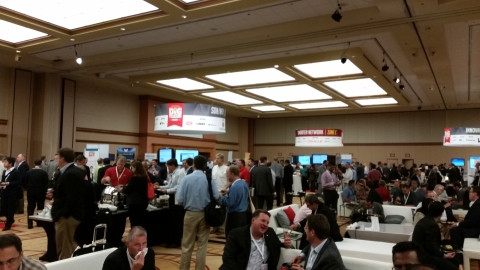Light Reading’s Big Telecom Event a Success with Attendees and Sponsors

In April, TSNN reported on the Big Telecom Event being produced by Light Reading. CEO and founder of Light Reading, Stephen Saunders had referred to the Big Telecom Event as the anti-tradeshow in an article he wrote announcing the event.
BTE took place last month in Chicago, and the question on many people’s minds is: Was the event his readers asked for, indeed an event they wanted. Also, were his sponsors happy not having a traditional trade showfloor?
Saunders' goal was to have 1,000 attendees, and he wanted at least half in attendance to be service providers. They ended with more than 1,500 attendees from across the world, 60 percent of which were service providers, or non-sponsoring attendees.
According to a post-event survey, 96 percent of respondents rated the event’s content as “outstanding,” “very good” or “good.”
As to Saunders’ previous assumption that if he could draw senior telecom decision-makers at service providers and carriers around the world, the equipment manufacturers (sponsors) would follow, that seems to have been the case.
“We were sold out. We were turning [sponsors] away in the last six weeks before the event which is frustrating,” Saunders said.
Because space sold out this year and because of a 78 percent renewal rate at the event itself, the Big Telecom Event will be tripling their demo-hall space to allow for more sponsors and doubling the size of each sponsor demo area.
As a result of this growth, they will be moving to Chicago’s McCormick Place next year. Dates already are set for June 9-10.
That is welcome news to Mark Dalglish, senior marketing manager at Fujitsu and Platinum sponsor of BTE. Fujitsu also has signed on as Platinum sponsor for next year’s event.
In regards to this year’s layout of the demo spaces Dalglish said, “They made a valiant attempt at identifying zones by technology, and then having vendors in those zones that relate to it.” Dalglish felt that probably worked well for the buyers, but it made it harder on the vendors as they were right next to their competitor. It made it difficult to have a conversation.
Joe Cumello, chief marketing officer at Cyan, also a Platinum sponsor, said he was very pleased with the demo format.
“In an industry that’s become jaded on all these different trade shows and events they have to go to, this is the right approach,” he added. “These guys are coming to the show to evaluate technology. If you can actually show them something, it’s much more worthwhile.”
Saunders said they would be sticking with the no exhibit hall model and continuing with the demo structure. While he was pleased overall with the quality of the demos, he added that he does see areas for improvement.
“Next year, I would put more rigor into what people were bringing to the demos. Not just in terms of the people, the right people were there,” Saunders said. “I thought some of the demos were not as on target as they could have been. They could have been improved with a bit of feedback from us on the content side.”
Dalglish said he felt it was a little open ended as far as the definition of the demo area, what it would be, and what was allowed. He added that he didn’t see a whole lot of difference in what many of the vendors were doing at BTE vs. a trade show. He also thought more oversight was needed there.
While Cumello agreed there were different interpretations for what constituted a demo amongst vendors, Cyan’s approach was to show their technology in action and to bring multiple partners and a customer into their demos as well, creating a use case type environment.
“This demo format helps level the competitive playing field,” he added. “That’s one of the reasons we made the choice to participate at the level we did.”
Cyan will also be returning next year as a Platinum sponsor. “We were just jammed the whole show, we were packed. From a results standpoint it was obviously a success for us.”
Back in April, Saunders was not too concerned about how the lack of an exhibit hall might impact his bottom line.
He said he was more concerned about maintaining the long-term health of an event when attendees and sponsors get tired of being taken for granted. Saunders is playing the long game and is willing to sacrifice easy money for long-term gain.
Apparently, he will not have to wait as long as he may have thought. Saunders said the inaugural BTE was a very profitable event for them.
“We’re investing all of that money back into the company right now through hiring new analysts and new editors to drive content to the next level,” he added. “Next year’s BTE will see the benefit of all of that.”
So, now the real question is, is the Big Telecom Event an anti-trade show, or is it in fact, the trade show of the future?


Add new comment